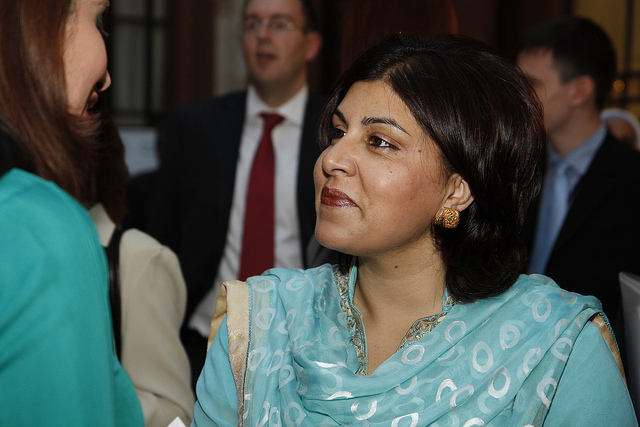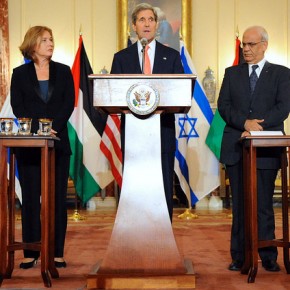I find Sayeeda Warsi curious. Despite our political differences, it is hard not to find some kinship in her stories of Paki-bashing, while being raised by a working-class Pakistani textile worker. It’s similarly difficult not to be impressed by her marital history, as she broke up her first arranged marriage in favor of another. Although this is hardly a revolutionary act, I recognize it as remarkable in its own way in our deeply sexist community. Unfortunately, that’s where the interest ends.
I usually avoid the term “token.” It lacks subtlety and is a bit patronizing. However, when describing Warsi, everything about her career screams “token.”
The trajectory of Warsi’s career is clear evidence of this. She began associating with Conservative circles in the 1990s, and in 2003, attended a fringe party conference in Blackpool. Oliver Letwin scouted her for candidacy, and she stood unsuccessfully for Dewsbury in 2005. David Cameron then gave her a peerage in 2007, making her Baroness Warsi. This would be a bewildering act of political generosity if Warsi didn’t serve an alternative purpose of adding token diversity to the Conservative Party through the shadow Cabinet. This was not all. Despite her electoral loss, she not only served as the Shadow Minister for Community Cohesion and Social Action, but was also special adviser to Michael Howard on community relations. Cameron even appointed her vice chairman of the Conservative Party with responsibility for cities.
“Token” is the only way to describe a woman who was so quickly promoted to senior positions before her abilities were even demonstrated. While Warsi did shine when working with Lord Ahmed to mediate in the Sudanese teddy bear blasphemy affair, her overall contributions to the House of Lords left much to be desired. In the weeks leading up to the 2010 parliamentary election, she had yet to show any significant distinction apart from wearing her salwar kameez (though I do enjoy this photo-op.)
Warsi’s main purpose appeared to be adding picturesque diversity to Cameron’s vision of a Conservative Party that could “heal” Britain’s allegedly fractured social fabric. This was seen to spectacular effect during a controversial 22 October 2009 episode of Question Time, in which British National Party leader Nick Griffin appeared for the first time. Warsi criticized Griffin, and presented the Tories as a warm and community-based alternative to the far-right group. After the program, which won her praise, Warsi appeared primed for a senior government position.
This was despite the controversies that were already surrounding her at that point. Warsi had already been slammed for her support for British involvement in the U.S.-led occupations of Iraq and Afghanistan, particularly by British Muslims who were alienated by the conflicts. She was also tied to homophobic campaign leaflets from her Dewsbury run that claimed the Labour-supported Sexual Offences (Amendment) Act of 2000 was “allowing children to be propositioned for homosexual relationships” due to a lowering of the homosexual age of consent. Warsi never apologized for the offensive material.

Following the formation of a Conservative-Liberal Democrat coalition after a hung parliament, newly-elected Prime Minister Cameron appointed Baroness Warsi to cabinet as Minister Without Portfolio on 12 May 2010, to much fanfare. She had also become co-Chairman, with the Jewish Lord Feldman, of the Conservative Party. The pair was supposed to epitomize Cameron’s new standards of Tory inclusiveness. But, most specifically, Warsi inclusiveness. With good reason. She was Britain’s first female Muslim cabinet minister.
Some readers may find it unfair to expect the Baroness to represent her entire minority. However, Warsi herself has spoken very cynically about her role in broadening the Conservative Party’s appeal. Much of it relies on her status as a Pakistani woman, as evidenced by statements such as this, at the 2012 Republican National Convention: “I’m a woman, I’m not white, I’m from an urban area, I’m from the North, I’m working class – I kind of fit the bill. All the groups that we’re aiming for are groups that I’m familiar with.” Although she denies being a token, Baroness Warsi is obviously aware of her role in the coalition.
We are therefore allowed to discuss how she represented these populations on a cabinet level, especially since it was obvious to many observers that Warsi was expected to help the Prime Minister negotiate the politics of ethnicity and religion.
And she did a terrible job. Although Warsi was praised for handling important issues of Islamic fundamentalism, such as forced marriages, and it was welcome to hear a cabinet leader openly condemn Islamophobia, her progress was deeply uneven. This is because of other moves against Britain’s embattled Muslim minorities, which came with her approval. In addition to her assistance in formulating deeply classist and racist policies on terrorism and extremism, Warsi was a well-known contributor to Prime Minister Cameron’s tiresome speech at the Munich Security Conference in February 2011, in which he called on Muslims to accept British values. Warsi was also harsh when it came to defending the rights of marginalized communities more broadly, allowing the Equality Act to be weakened, the Equality and Human Rights Commission to have its funding slashed, and various anti-immigrant measures to be imposed such as increasing the income threshold for those wishing to sponsor a non-EU spouse or partner. When taken into account with her earlier bouts of homophobia, which were thankfully softened in this later stage of her career, the image that emerges is of a token Pakistani who relishes the opportunity to take a position of power.
Ultimately, the Conservative Party turned on its deeply unpopular former golden child. By March 2012, Warsi was being savagely criticized by Conservative MPs during a meeting of the 1922 Committee for her handling of MEP Roger Helmer defecting to the populist United Kingdom Independence Party. Her response was so badly received that it sparked instant calls for her replacement. This inevitability likely framed the parliamentary inquiries into her finances, and her being investigated for breaking ministerial rules. We must remember that during this same period, Culture Secretary Jeremy Hunt was managing to evade similar treatment for his behavior during Rupert Murdoch’s attempt to control BSkyB. Warsi was being targeted by these procedures for a reason. During the September 2012 cabinet reshuffling, Baroness Warsi was newly assigned as Minister of State for Faith and Communities, and safely pushed out of the spotlight.
But is that a good thing? Sayeeda Warsi’s career is easy to classify: she is a token Pakistani, is aware of it, and enjoys what little power and prestige she can gain as a result of it. Perhaps matters are actually worse now that she is increasingly irrelevant to the wider party, because it means that she is more nakedly a tokenized cabinet member. She has no real power except the prestige, and contributes nothing except her skin colour. Prime Minister Cameron has always needed Baroness Warsi to be trotted out as purported evidence that the Conservative Party is not, to the core, a bastion of upper-class cynics and tempered white supremacists. British parliamentary structures allowed for this to be more obviously done than has been the case with the Republican Party in the United States. Warsi remains in the role of “token.” As her career develops, she will continue to happily adopt it for quite some time.
Photographs courtesy of the UK Home Office and The Edge Foundation. Published under a Creative Commons license.





